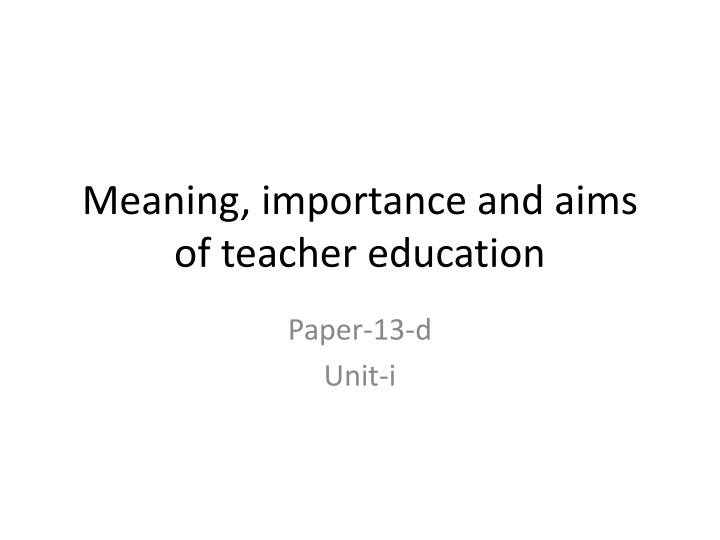
Importance and Aims of Teacher Education: Understanding the Role and Scope
Teacher education encompasses the process of preparing classroom teachers through pre-service and in-service programs. It involves a continuous, evolving, and diversifying system that equips educators with teaching skills, pedagogical theory, and professional development. The aims include fostering a better understanding of students, building confidence, enhancing teaching methodologies, cultivating positive attitudes, staying updated on educational developments, improving standards, and promoting democratic values. Humayun Kabir emphasized the critical role of good teachers in the success of any educational system.
Download Presentation

Please find below an Image/Link to download the presentation.
The content on the website is provided AS IS for your information and personal use only. It may not be sold, licensed, or shared on other websites without obtaining consent from the author. If you encounter any issues during the download, it is possible that the publisher has removed the file from their server.
You are allowed to download the files provided on this website for personal or commercial use, subject to the condition that they are used lawfully. All files are the property of their respective owners.
The content on the website is provided AS IS for your information and personal use only. It may not be sold, licensed, or shared on other websites without obtaining consent from the author.
E N D
Presentation Transcript
Meaning, importance and aims of teacher education Paper-13-d Unit-i
meaning Teacher education is the branch of education discipline which deals with the process of preparing classroom teachers. Preparation of teacher and their qualitative improvement is the responsibility of the system of teacher education. Generally two types of teacher education we can see. A) pre-service teacher education B) In-service teacher education
Definition of teacher education Good s Dictionary of Education, all formal and informal activities and experience that help to qualify a person to assume the responsibilities as a member of the educational profession and to discharge responsibilities most effectively is teacher education Dunkin, teacher education is not teaching how to teach, but it is that knowledge skill and ability which is relevant to the life of the teacher Prof. B. K. Passi, teacher education means programs of education, research or training of persons for equipping them to teach at primary, secondary and senior secondary stages in schools and includes non-formal education, part time education, adult education, and correspondence education.
Teacher education= teaching skills + pedagogical theory + professional skills
Nature of teacher education Continuous process. Teachers are made not born. Broad and comprehensive. Ever-evolving and dynamic. Diversification. Knowledge base. The crux. Teacher education is a system.
Scope of teacher education Teacher education at different levels of education Triangular basis of teacher education. Aspects of teacher education.
Aims and objectives(functions) of teacher education Better understanding of the students. Building confidence. Methodology of teaching. Building a favourable attitude. Familiarizing with the latest development of education. Improving standards. Training for democracy.
Need and importance of teacher education Humayun Kabir rightly stated, without good teachers, event the best of system is bound to fail. With good teachers, event the defects of a system can be largely overcome. Secondary Education Commission(1952-66) observed, the most important factor responsibilities of education reconstruction is the teacher, his personal qualities, his educational qualification, his professional training and the place of occupies in the school as well as in the community. Kothari Commission(1964-66) stressed the importance of teacher education stating as, in the world based on science and technology, it is education that determines the level of prosperity, welfare and security of the people and that a sound programme of professional education of teacher is essential for the qualitative improvement of education.
Knowledge of the child. Knowledge of the teaching-learning process. Organizing co-curriculum activities. Organizing guidance services. Knowledge of methods of evaluation. Developing favourable attitude. Improving standard of education. Creation of social insight. Familiarity with the latest in education. Pre-requisite for better planned education.
Types of teacher education institution First cycle institutions: (these institutions prepare teachers for pre-primary and elementary school children. They provide nursery teachers training certificates and diploma in education). Second cycle institutions: ( these institutions prepare teachers for secondary schools and provided B.Ed, B.Ed(special education), B.Ed(art education), B.Ed(yoga education), and B.P.Ed degrees. Third cycle institutions: these institutions are the university departments of education and colleges of education preparing students for M.Ed and M.A(education). These institutions produces teacher educators to teach in the first amd second cycle institutions.
